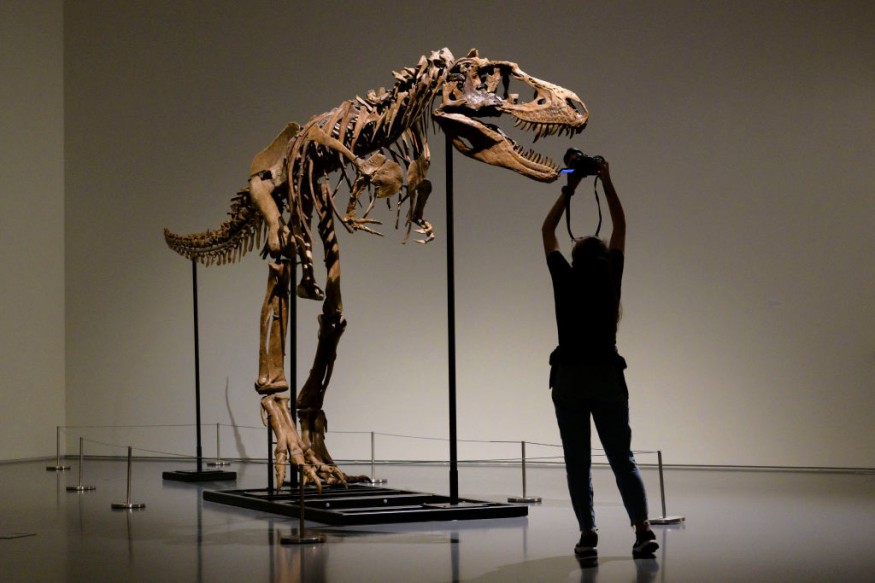
As per Sotheby's auction house, the earliest sample of the meat-eating dinosaur known as the Gorgosaurus, is going to be auctioned off in New York City on July 28
$8 Million Worth of Dinosaur Bones
As per the Natural History Museum (NHM) in London, Gorgosaurus, a high point wild animal, managed to survive from 80 million to 73 million years back, hundreds of thousands of years prior to its actually more renowned close family member, the formidable Tyrannosaurus rex; it harassed its food source in sections of what is today the western United States and Canada.
The creature's carcass, which stands nearly 10 feet tall and 22 feet in length, or roughly the size of three king-size beds set up from head to toe, is likely to fetch at least $5 million and maybe as much as $8 million, according to Sotheby's.
As earlier told Live Science Thomas Carr, a vertebrate paleontologist and adjunct lecturer of biology at Carthage College in Kenosha, Wisconsin, who has not been engaged in the Gorgosaurus transaction, there still are 58 T. rex fossils are held in national institutions, whereas 53 are commercialized or operated by the private sector, implying that researchers do not have assured accessibility to the quarter of the existing T. rex fossils.
Privately dinosaur relic proprietors would be absolutely no duty to disclose their collections with researchers, and so several evolutionary biologists dislike examining remains that aren't generally accessible to the research world, because accessibility to the sample might be canceled at any moment.
Many dinosaur bones already have been auctioned off, notably Deinonychus, the raptor that influenced the Velocirators' design in the Jurassic Park films, a meat-eating Allosaurus, as well as Stan the T. rex, was listed for sale for $31.8 million in October 2020, earning it the highest valuable dinosaur specimen yet auctioned, as initially disclosed by Live Science.
While Kat Schroeder, a paleomacroecologist at the University of New Mexico who was not associated with the sale remarked that it was unfortunate to have seen a fine example of a rare dinosaur possibly on its journey to a prospective buyer.
According to the Royal Tyrrell Museum, researchers aware of at least 12 entire or near-complete Gorgosaurus heads and many incomplete skeletons, rendering every piece exceedingly important.
Gorgosaurus First Ever Specimen to be Auctioned
Ever since Schroeder first began practicing as a paleontologist in the 1980s, he recalled, proprietors in the United States sometimes allowed academics explore for relics on their estate for free of charge since dinosaur remains were just not considered valuable at the time.
Other option, albeit not for this species, is for paleontologists to contact with commercial miners, who might just gift or trade fossils to academics at a lower fee, he added.
Moreover, Carr explained that even 58 individuals is a tiny amount for academic research, thus the 12 documented Gorgosaurus fossils are an extremely small cohort.
The Gorgosaurus, which will be marketed shortly, was discovered in 2018 on homesteads in the Judith River Formation in Havre, Montana, a region known for its dinosaur-era fossils.
However, the success of the Jurassic Park films, the development of eBay, and stories of millionaires purchasing dinosaur remains as artworks have all escalated the value of dinosaur bones in the generations thereafter.
"Every occasion a vertebrate specimen is auctioned, perhaps anonymously, it's upsetting," said Gregory Erickson, a paleobiologist at Florida State University in Tallahassee who wasn't even associated with the sale.
Unfortunately, samples in museum homes do not advance natural history studies, since they are either not released publicly to researchers, destroyed throughout preservation, transportation, or maintenance, or vital details on the origin is destroyed.
Related article : Ancient Human-Like Fossils in South Africa may Rewrite the History of Human Civilization
© 2026 NatureWorldNews.com All rights reserved. Do not reproduce without permission.





